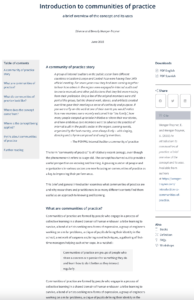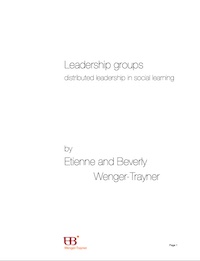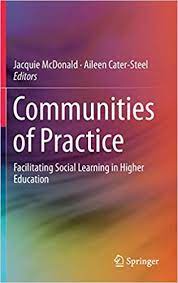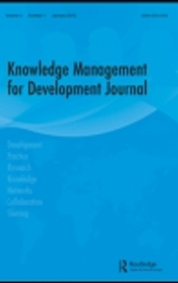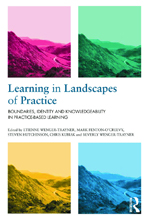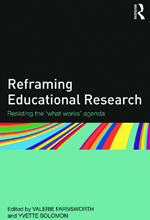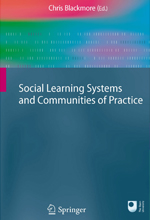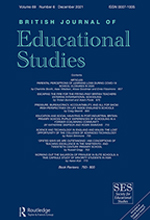Publications
short reads, articles, and interviews
Short reads for practitioners
Communities of practice: a brief introduction
Etienne and Beverly Wenger-Trayner
This brief overview introduces the concept of communities of practice: what they are, what they look like and what they do, where the concept came from and where it was applied. The article also addresses a few common myths about communities of practice.
2015
Leadership groups: distributed leadership in social learning
Etienne and Beverly Wenger-Trayner
A few years ago, we started setting up leadership groups in the communities of practice that we work with. The idea goes like this: everyone at a meeting joins a leadership group – and each group stewards one aspect of the learning process. Distributing leadership this way generates an experience of ownership and agency that accelerates the development of the community. We have also found this practice useful for other types of meetings.
2013
Academic papers and book chapters
Boundaries and boundary objects
an evaluation framework for mixed methods research
Wenger-Trayner B, Wenger-Trayner E, Cameron J, Eryigit-Madzwamuse S, Hart A.
This paper introduces an earlier version of our value-creation framework as a mixed methods research tool. We explore how the framework can act as a boundary object across “boundaries of practice,” specifically across quantitative and qualitative methods, philosophical paradigms, and participant perspectives. Using the example of the Imagine Program at the University of Brighton. we argue that the framework’s focus on cycles of value creation can provide a shared language for negotiating interpretation and action across those boundaries. This is an important contribution to mixed methods research where researchers still struggle with boundaries arising from commitments to different methods and paradigms, and from attention to social justice.
2019
Journal of Mixed Methods Research, Vol. 13, No. 3, pp. 321-338. doi:10.1177/1558689817732225
Communities of practice go to university
Etienne and Beverly Wenger-Trayner
This foreword to a book on communities of practice in higher education delineates three phases in the evolution of the concept of community of practice—from its origin in studies of apprenticeship, to its adoption as a valuable form of learning partnership across sectors and industries, to its role in defining regimes of competence in landscapes of practice.
2018
Foreword in: Communities of practice facilitating social learning in higher education Jacquie Mcdonald, Aileen Cater-Steel, editors Springer
Financial governance
accounting for social learning in a regional network in Africa
Beverly Wenger-Trayner
This paper demonstrates the use of the framework in a project supported by the World Bank in Southern and Eastern Africa. The framework was used both for evaluation and for strategic renewal of a regional network of members of parliament and their clerks. The paper also includes some reflections on the development of the framework and its potential applications.
2017
Knowledge management for development journal, 2017 Vol. 13, No. 3
Learning in a landscape of practice: a framework
Etienne and Beverly Wenger-Trayner
This chapter moves the focus from the regimes of competence of single <communities of practice> to learning in <landscapes of practice>. We argue that this move is necessary to make sense of <social learning capability> at scale.
To adapt the learning theory to the concept of landscape of practice, we introduce the concept of knowledgeability. We define it as an orientation to the landscape that derives from learning in relations to a landscape, which includes a lot of practices in which one cannot claim competence, but about which one needs to have enough understanding to proceed productively. Theoretically knowledgeability is a landscape-level counterpart to the concept of competence, which is defined at the level of communities of practice.
2014
This is the introductory theory chapter in our book Learning in landscapes of practice
The practice of theory
confessions of a social learning theorist
Etienne Wenger-Trayner
This essay is a reflection on my experience as a social learning theorist. Because of the specific kind of knowledge social theory produces, I suggest that various social theories need to “plug and play” with each other rather than replace each other. I illustrate this principle with a few examples. I argue that this calls for a discipline and a meta-theory of progress specific to social theorizing.
2013
Chapter 8 in: Valerie Farnsworth and Yvette Solomon, editors Reframing Educational Research: resisting the ‘what works’ agenda. Routledge.
Communities of practice and social learning systems
the career of a concept
Etienne Wenger
This article does two things. On the one hand, it relates the conceptual framework of communities of practice to systems theory. On the other, it takes this as an opportunity to review the career of the concept of community of practice since its inception in Etienne’s work with Jean Lave in 1987. This review includes ways the concept has been adopted and ways it has been critiqued.
2010
Chapter 11 in: Christine Blackmore , editor Social Learning Systems and communities of practice. Springer Verlag and the Open University.
Interviews
Communities of practice as a social theory of learning
a conversation with Etienne Wenger-Trayner
Valerie Farnsworth, Irene Kleanthous, Etienne Wenger-Trayner
This interview by two educational researchers relates key concepts from the theory to their uses in research and to the perspectives of other social theories. The conversation clarifies basic ideas such as what constitutes a ‘community of practice’ and how identity and participation are conceptualized to develop a social theory of learning in which power and boundaries are inherent. The interviewers draw on these conceptual discussions to consider how social learning theory resonates with current debates in education.
British Journal of Educational Studies, 2016. Vol. 64, No 2, pp. 139-160 DOI: 10.1080/00071005.2015.1133799
The evolution of the communities of practice approach:
toward knowledgeability in a landscape of practice
—an interview with Etienne Wenger-Trayner
Omid Omidvar and Roman Kislov
This interview discusses the evolution of the theory of communities of practice over the past two decades in Etienne’s work. He talks about the origins of communities of practice as a theoretical approach, identifies three phases through which this theory has evolved, and reflects on his professional trajectory as a theorist and consultant. Using his career as an example, he elaborates on the notion of knowledgeability as a relationship individuals establish with respect to a complex social landscape, beyond the specific communities where they are competent members.
Journal of management inquiry, 2014. Vol. 23, No 3, pp.:266-275 doi:10.1177/1056492613505908

